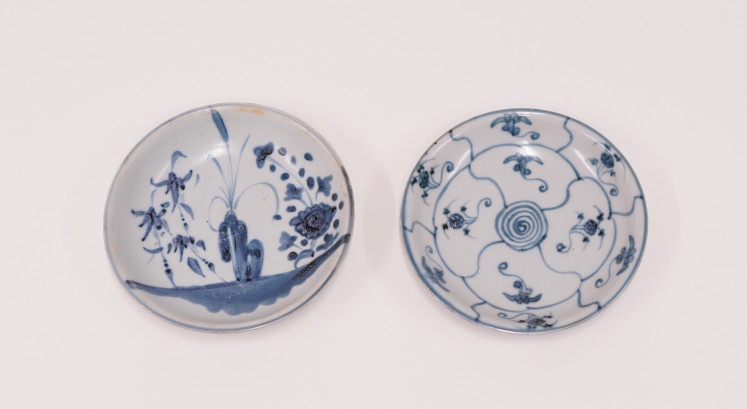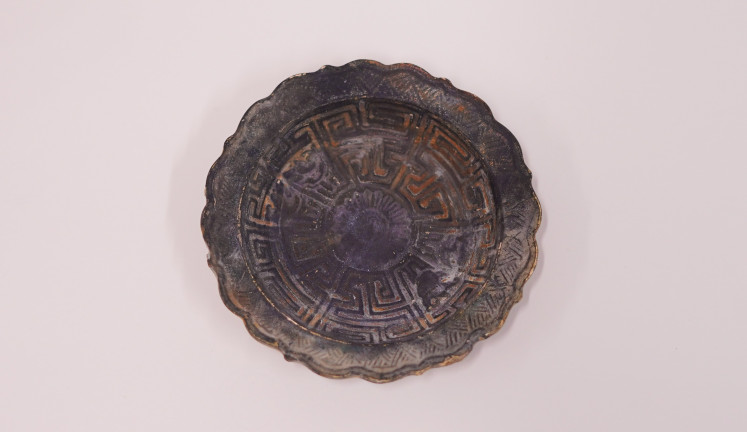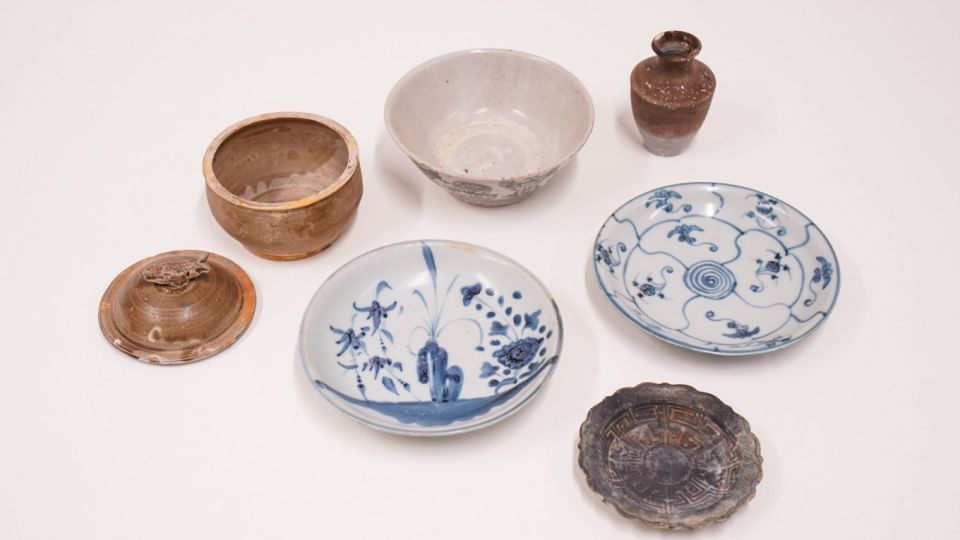October 5, 2022
JAKARTA – Australia returned hundreds of artifacts from the Chinese trade ship Tek Sing to Indonesia 200 years after the vessel sank off the archipelago’s Bangka-Belitung islands with the loss of more than 1,600 lives and a cargo of nearly 350,000 porcelain pieces.
The porcelain plates laid on the display table at the Indonesian Embassy to Australia in Canberra, their swirling blue patterns as vivid now as when they were manufactured about 200 years ago.
A saucer laid unassumingly near the set. While its discolored façade reflected the toll age and wear took on the dish, the saucer’s intricate, geometric patterns remain eye-catching. Overall, they reflect the masterful craftsmanship and artistry of blue and white Chinese porcelain pottery during their heyday between the 15th to 19th centuries.

Fine details: A closer look at two blue and white porcelain plates from the Tek Sing show the fine lines of their craftsmanship. (Courtesy/Courtesy of Australian Department of Infrastructure, Transport, Regional Development, Communications and the Arts)
A sort of homecoming
The crockery was among 333 ceramic pieces from the 19th-century wreck of the Chinese cargo ship Tek Sing (True Star) that Australia handed back to Indonesia after the pieces made their way to the country.
Australian Minister for the Arts Tony Burke handed the artifacts to Indonesian Ambassador Siswo Pramono at the Embassy on Aug. 17. The timing coincides with the 200th anniversary of Tek Sing’s sinking in 1822, as well as Indonesia’s Independence Day.
“Returning these items to Indonesia—where they belong—is about righting a wrong. These items should never have left Indonesia or been offered for sale. They belong with Indonesian cultural authorities so they can be properly preserved,” Burke said in a press release issued through the Australian Embassy in Jakarta.
“By returning these items to Indonesia, we also honor those who lost their lives [from the sinking of Tek Sing],” Burke said. He explained that the Tek Sing disaster killed more than 1,600 passengers and crew when the vessel sank in the Gaspar Strait off Indonesia’s Bangka-Belitung islands, Sumatra, on Feb. 6, 1822.
The scale of the disaster made it known as the “Titanic of the East”.
Siswo hailed the gesture. “The [artifacts] from the Tek Sing will enrich Indonesia’s collection of historical items. We hope that [the handover] will be one of the first steps in returning [Indonesian cultural objects] that have been illegally brought out of Indonesian territory,” he said.
The Australian Government’s Department of Infrastructure, Transport, Regional Development, Communications and the Arts noted that the gesture was months in the making, as they seized the ceramics on Mar. 9.
The Indonesian Embassy in Canberra reiterated the department. They noted that “police in [the Australian city of] Perth uncovered the illegal sale of ceramics from Indonesia in August 2020. [Indonesian experts] in Jakarta verified the find following intensive communication [on both sides],” the embassy asserted on its website.
However, the 333 artifacts are a fraction of the 350,000 pieces of Chinese blue and white porcelain that remains unaccounted for.

Undimmed by time: A saucer from the wreck of the Tek Sing shows its vivid symbols, even as it shows the strains of time and years of being under the deep sea. (Courtesy/Courtesy of Australian Department of Infrastructure, Transport, Regional Development, Communications and the Arts)
A tragic past, an uncertain present and the future
The British Museum’s website identified the Tek Sing as “a Chinese junk [trade ship] carrying porcelain bound for Java […] The Tek Sing [sailed] from Amoy [Xiamen and weighed] approximately 1,000 tonnes”. While porcelain might dominate the ship’s holds, it is far from the only commodity the vessel carried.
“The [Tek Sing’s] salvaged cargo contained mercury, sextants, pocket watches […] an iron and brass cannons, a bronze cannon […] Most of the porcelain is from the Dehua kilns [from Fujian province, China].”
The British Museum added that “British salvage diver Michael Hatcher found the wreck [of the Tek Sing] on May 12, 1999. The auction of the Tek Sing cargo was held in Stuttgart, Germany, in November 2000.” The Times noted that the sale garnered proceeds of 22.4 million Deutsche mark (US$11.2 million today).
Hatcher also donated his findings, including a porcelain bowl dating from China’s Qing Dynasty, to the museum in 2001.
Many of the objects from the Tek Sing ended up on sale worldwide on mobile auction apps like eBay and Etsy for prices ranging from $22 to $111. However, Indonesia did not entirely come away empty-handed.
“Following the receipt of a formal restitution request, on Aug. 20 2001 the Australian Government returned 71,939 ceramic objects [from Tek Sing] to the Indonesian Government,” said Australia’s Department of Infrastructure, Transport, Regional Development, Communications and the Arts, a year after Australian authorities intercepted containers filled with the objects.
The return of these artifacts reflected Australia’s commitment to “protecting and safeguarding the world’s movable cultural heritage”. The decision was in line with the country’s Protection of Movable Cultural Heritage Act, which “supports the return of foreign cultural property that has been illegally exported from other countries and imported into Australia”.
Indonesia backed the steps with a 2010 law on cultural monuments and relics and a 2017 law on the advancement of culture. Aside from the Tek Sing porcelain, Australia has also returned five decorated Asmat and Dayak skulls to Indonesia in 2006 and 2018, respectively, under the Protection of Movable Cultural Heritage Act.


